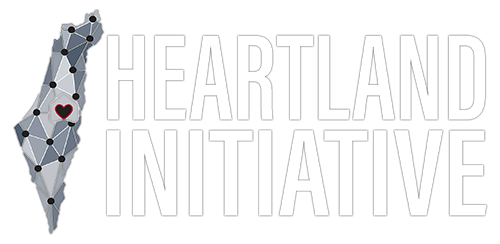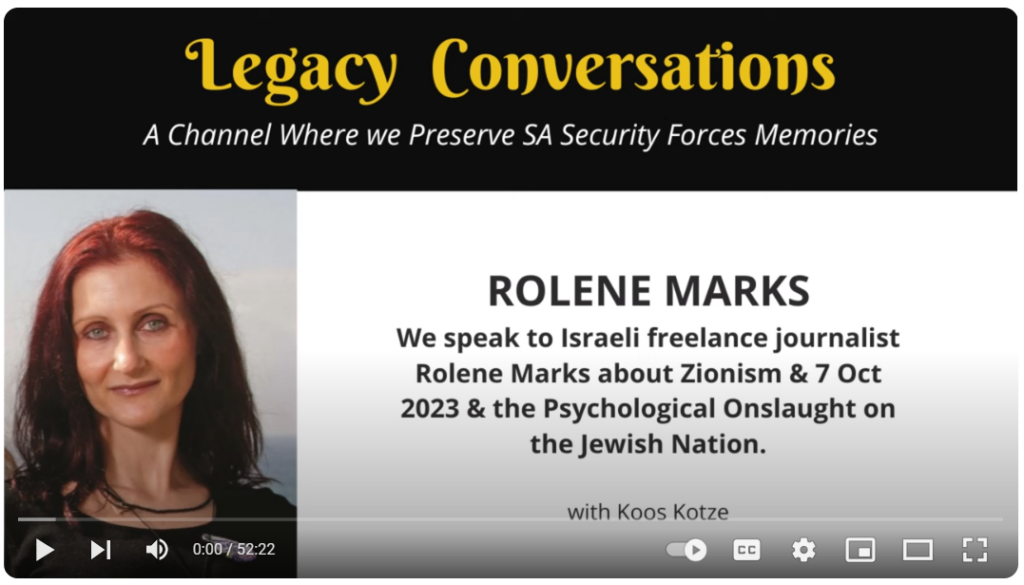
WATCH Beyond the Echoes of Conflict with Rolene Marks: Unraveling the Complex Tapestry of Israel, Zionism, and the Quest for Peace
By Gedaliah Blum, Senior Partner Heartland Initiative
Explore the complexities of the Israeli-Palestinian conflict with Rolene Marks, as she navigates the psychological warfare, the weaponization of language, and the quest for self-determination.
In a world where historical narratives echo through the corridors of modern geopolitics, the discourse surrounding Israel, its ideological foundation of Zionism, and the Jewish people’s quest for self-determination stands as a complex testament to our era’s polarizations and complexities. Rolene Marks, a seasoned advocate for Israel with extensive experience in media, advocacy, and volunteer work, brings her unique perspective to these discussions. Her insights, shared during her presentation on Legacy Conversations, delve into the heart of these intricacies, illuminating the multifaceted realities shaping Israel’s societal and geopolitical landscape today.
The Psychological Battleground of Modern Conflict
Marks’s vivid recounting of the harrowing events known as Israel’s “Black Sabbath” transcends a simple chronicle of violence; it serves as a stark illustration of the profound psychological warfare that underpins physical conflicts. This dark chapter, defined by the heinous acts of terror perpetrated by Hamas, underscores not just the physical threat to life but the strategic deployment of terror to erode societal morale and cohesion. The deliberate broadcasting of these atrocities by the perpetrators aims to glorify their actions within their ranks and sow seeds of terror among the Israeli populace. This chilling strategy, as detailed by Marks, highlights the evolving nature of conflict, where the psychological toll on civilians becomes an integral component of warfare.
The Weaponization of Language and Identity
At the heart of Marks’s discussion is the transformation of terms like “Jew” and “Zionist” from identifiers into weapons of vilification, used to delegitimize the Jewish quest for a homeland. This semantic distortion exemplifies the broader battle over narrative and identity that unfolds globally. Marks elucidates how “Zionist,” once a symbol of Jewish national liberation, has been contorted into a term of vilification, illustrating the power of language as a tool to undermine Israel’s legitimacy. This battle over words reveals the impact of narrative control in international politics and public opinion, highlighting that mastery over narrative can wield as much power as traditional military might.
Selective Outrage and the Double Standards of the International Community
The lack of response from the international feminist movement and human rights organizations to the gender-based violence against Israeli women during the conflict starkly illustrates the selective outrage characterizing global discourse on Israel. This disparity in advocacy exposes a troubling double standard, where principles of human rights are applied inconsistently, influenced more by political biases than by a commitment to justice. Marks’s critique compels us to confront the uncomfortable truth that international solidarity and advocacy are, at times, conditional, based on the identities of the victims and perpetrators. This selective outrage not only questions the universality of human rights but also the integrity of the international community’s commitment to justice and dignity for all.
The Ethical Landscape of Warfare: Defense of the Israeli Defense Forces
In addressing criticisms of the Israeli Defense Forces (IDF), Marks embarks on a discussion about the ethical and legal frameworks guiding the IDF’s operations in conflict scenarios. By distinguishing between Hamas’s tactics and the IDF’s principled approach, Marks counters narratives that condemn Israel’s military actions. This discussion not only rebuts allegations of indiscriminate violence but also invites a deeper appreciation for what constitutes a proportionate and ethical response in asymmetrical warfare. The emphasis on the IDF’s commitment to minimizing civilian casualties and adhering to international laws of armed conflict serves as a counterpoint to Hamas’s brutality, highlighting the moral complexities in modern military engagements.
Conclusion: A Call for Nuanced Engagement
The insights from Rolene Marks’s presentation serve as a profound exploration of the historical grievances, existential threats, and nuanced realities defining the Israeli-Palestinian conflict and the broader Middle Eastern geopolitical context. By examining the psychological dimensions of warfare, the dynamics of language and identity, inconsistencies in international advocacy, and ethical quandaries faced by military forces, Marks advocates for a more informed, empathetic engagement with one of our time’s most enduring conflicts.
Marks’s narrative challenges us to look beyond political slogans and media portrayals, urging comprehensive engagement with the historical narratives, existential fears, and aspirations for peace that pervade the lives of those caught in history’s web. It is a call to the international community, policymakers, and individuals to foster dialogue rooted in understanding, empathy, and a principled commitment to justice for all parties involved, paving the way for a future where mutual respect and a shared commitment to peace can flourish.
About Rolene Marks:
Rolene Marks, a dedicated voice for Israel, engages with audiences across radio, television, and various global publications. She plays a crucial role in Media Team Israel, an advocacy group dedicated to countering media bias, where she also steps in as a spokesperson. Marks is involved with Truth be Told, a new initiative committed to promoting factual narratives.
Living in Modiin, Israel, she lends her time to WIZO, contributing significantly, including past representation at the World Zionist Congress. Her insights on political affairs related to Israel and the Middle East are a regular feature on Chai FM, a radio station based in Johannesburg.
Marks also leads Rolene Marks Consulting, offering expertise in marketing, social media, and training for Israel advocacy.
Her commitment to fostering understanding and dialogue was highlighted in 2007 when she took part in the Israeli Ministry of Foreign Affairs Young Jewish Diplomats Leadership course.
For more of Rolene’s insights, visit her blog at www.rorosrantings.wordpress.com.


